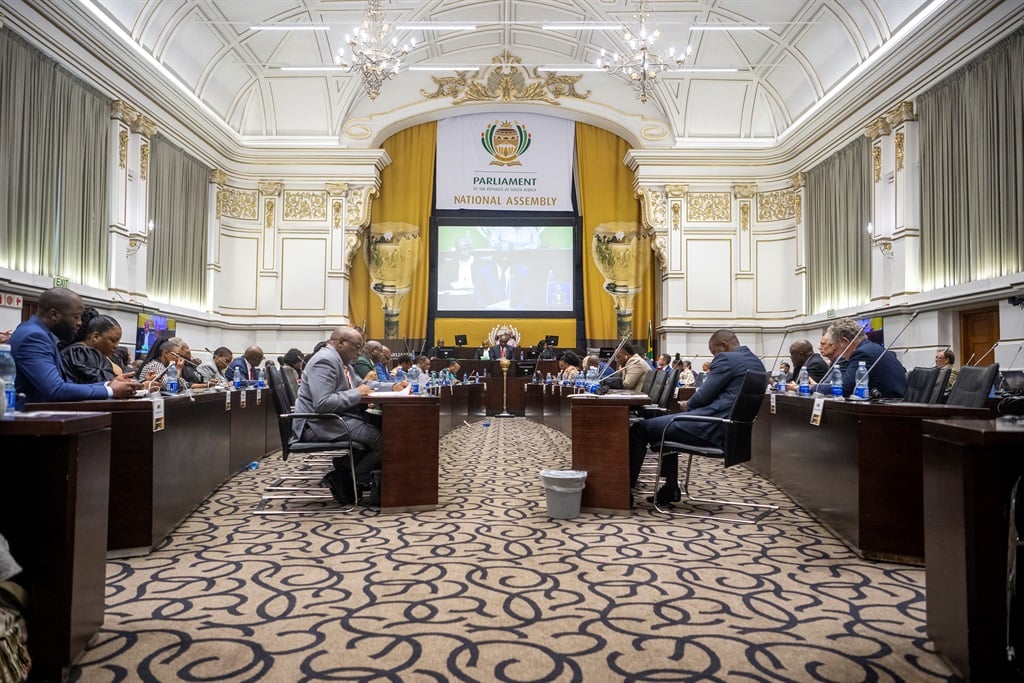
- NGOs, religious organisations, and security companies would have to be vetted by intelligence agencies.
- This is a requirement under the General Intelligence Law Amendment Bill, which intends to restructure the State Security Agency into a domestic intelligence agency and an international intelligence service.
- The bill also provides for “bulk surveillance of international signals” and would allow the minister to make regulations on, amongst other things, “information security”.
New proposed intelligence legislation will subject people wanting to start a non-governmental organisation to a “security competence test”, allow the minister responsible for state security to make “information security” regulations and allow mass communications surveillance.
The General Intelligence Laws Amendment Bill (GILAB) was approved by the Cabinet in May. It intends to give effect to the recommendations of the Presidential High-Level Review Panel on the State Security Agency (SSA), which was chaired by former minister Sydney Mufamadi, and the State Capture Commission, chaired by Chief Justice Raymond Zondo.
Both the Mufamadi panel and the Zondo Commission took a dim view of the SSA.
The panel found the SSA “had largely become a parallel intelligence structure serving a faction of the ruling party and, in particular, the personal political interests of the sitting president of the party and country”.
Chief among its recommendations was that the SSA should be restructured into a domestic intelligence agency and a foreign intelligence service.
ANALYSIS | Draconian new Intelligence Bill: A three-point blueprint for State Capture 3.0
This is one of the main aims of GILAB, which will amend the National Strategic Intelligence Act and other legislation to establish the Foreign Intelligence Service – which will be responsible for “foreign intelligence gathering so as to identify opportunities and threats to national security” and the Domestic Intelligence Agency which will be responsible for counter-intelligence as well as gathering of domestic intelligence in order to identify threats to national security”, according to the bill’s memorandum.
The bill defines national security as “the measures, activities and the capabilities of the state to pursue, advance any opportunity or potential opportunity and the security of the Republic and its people including national interests and national values as contemplated in Section 198 of the Constitution”.
Section 198 of the Constitution states that national security must “reflect the resolve of South Africans, as individuals and as a nation, to live as equals, to live in peace and harmony, to be free from fear and want and to seek a better life”, “be pursued in compliance with the law, including international law” and “is subject to the authority of Parliament and the national executive”.
ALSO READ | 'A full-blown dictatorship': Zimbabwean President Mnangagwa signs draconian Patriotic Bill
As part of its work to “fulfil national counter-intelligence responsibilities”, the bill requires the Domestic Intelligence Agency to “conduct security competence test on categories of applicants and employees of organs of the state, including persons who seek to establish and operate non-governmental organisations, churches or religious institutions, and departments of state identified by the minister and issue or decline to issue a security clearance certificate.”
Furthermore, the bill states that the intelligence services “must conduct a vetting investigation in the prescribed manner to determine the security competence” of a number of persons, including people who “seeks to establish and operate a non-governmental organisation or religious institution” and “seeks to establish a private security company in the Republic”.
The other people who must be vetted are more what one would expect: people to be employed or render a particular service to an organ of state; have access to classified information and intelligence in possession of that organ of state; or have access to areas designated as national key points or critical infrastructure areas in terms of the relevant law.
In terms of the bill, a “security competence test means administering a vetting investigation to determine the security competence of a person and if such person is suitable to access classified information or critical infrastructure of the state or is viewed as vulnerable to blackmail, undue influence or manipulation or security compromise”.
The purpose of these provisions is not explained in the bill’s memorandum or in the Cabinet statement that announced that the bill has been approved.
READ | On autopilot: Spy agency hurtling forward without direction as two key positions remain leaderless
Another clause of the bill enables the minister to make regulations relating to “information security and the protection of intelligence”. “Information security” is not defined in the bill.
“These regulations will be approved by the minister after consultation with the Joint Standing Committee on Intelligence (JSCI),” reads the bill’s memorandum. The JSCI, the parliamentary committee overseeing the intelligence services, usually operates behind closed doors.
These regulations could include a code of conduct of former and current members of the intelligence services, current and former ministers and current and former members of Parliament with access to intelligence information.
In February 2021, the Constitutional Court upheld a High Court ruling that outlawed bulk interception activity until it is provided for in law.
“To comply with the order of the Constitutional Court, the bill is providing for the mandate of bulk interception activities within the intelligence agency,” reads the bill’s memorandum.
“It will be noted that the intelligence services referred to above also have the foreign signals collections capacity and this recommendation is not unique to South Africa only.”
The memorandum further states that it is critical that bulk interception activities are provided for in law, to be in line with the Constitutional Court’s order and “to ensure that the intelligence services are fully capacitated to monitor national security threats from foreign signals”.
“Currently and due to this court order, the intelligence agency is unable to gather this crucial intelligence and this has a severe negative impact on the national security of the Republic and the work of the security structures.”
Furthermore, the bill would also provide for the establishment of an intelligence training academy.




 Publications
Publications
 Partners
Partners























